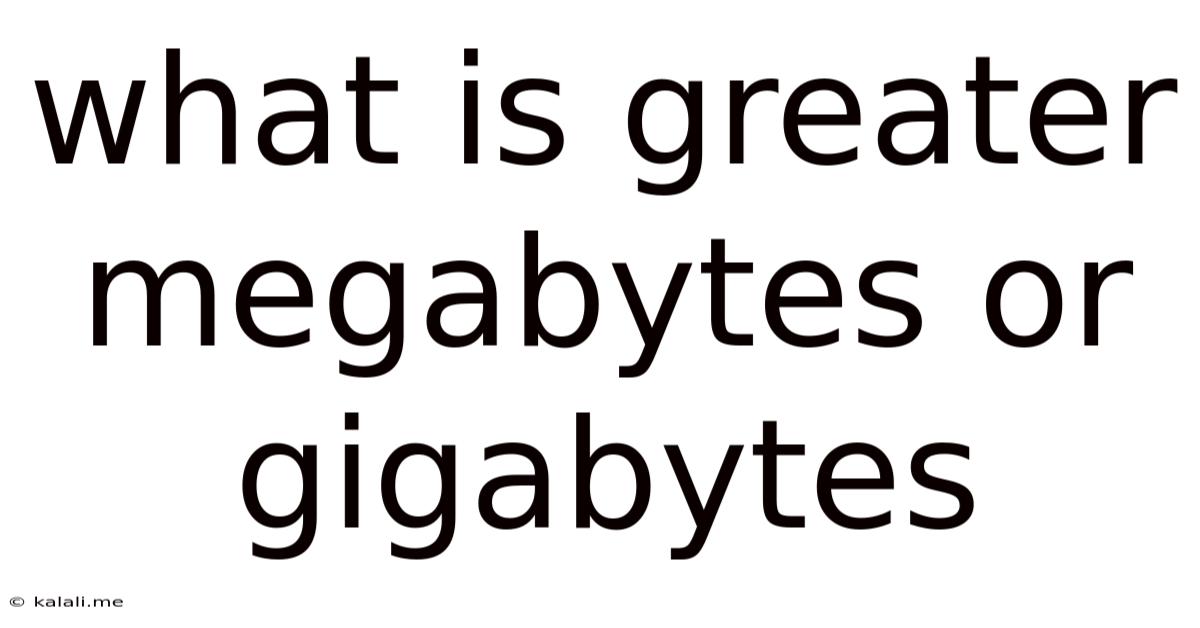What Is Greater Megabytes Or Gigabytes
Kalali
Jun 11, 2025 · 3 min read

Table of Contents
Megabytes vs. Gigabytes: Understanding the Difference in Digital Storage
Understanding the difference between megabytes (MB) and gigabytes (GB) is crucial in today's digital world, where we constantly deal with files, storage capacities, and internet speeds. This article will clarify the relationship between these units of digital storage and help you understand their practical implications. Essentially, gigabytes are much larger than megabytes. Let's delve deeper into the specifics.
What is a Megabyte?
A megabyte (MB) is a unit of digital information storage equal to one million bytes. Think of a byte as the smallest unit of data a computer can process. A single byte can represent a single character, like a letter or number. Therefore, a megabyte can store a significant amount of data, but it's relatively small compared to larger units. Common uses for megabytes include:
- Smaller images: A standard photo taken with a phone camera might be a few MBs in size.
- Short audio files: A short audio clip or a single MP3 song can easily fit within a few MBs.
- Text documents: Most Word documents, even lengthy ones, will still occupy only a few MBs of space.
What is a Gigabyte?
A gigabyte (GB) is much larger than a megabyte. In fact, a gigabyte is equal to one billion bytes, or 1024 megabytes. This significant jump in capacity means gigabytes are used to measure the size of much larger files and storage devices. Examples of files often measured in gigabytes include:
- High-resolution images: Professional photos, images used for print, or images with very high resolution are often measured in gigabytes.
- HD and 4K videos: Movies, TV shows, and even home videos recorded in high definition require considerable storage space, often measured in gigabytes.
- Software applications: Most modern software applications, especially games, take up several gigabytes of space on your hard drive.
- Large databases: Databases containing extensive amounts of information, frequently used in businesses, often occupy multiple gigabytes.
- Operating Systems: Your computer's operating system itself will require many gigabytes of storage space.
The Relationship Between Megabytes and Gigabytes
To put it simply, one gigabyte (GB) is equal to 1024 megabytes (MB). This means a gigabyte offers significantly more storage capacity than a megabyte. Understanding this relationship helps in judging the storage needs of your digital files and devices. For instance, a 1GB video file would be equivalent to 1024 MB.
Practical Implications: Choosing Storage
When purchasing storage devices like hard drives or USB drives, you'll encounter these units of measurement frequently. Understanding the difference between MB and GB allows you to make informed decisions based on your storage needs. For example, if you frequently work with high-resolution videos or large software applications, you'll need a storage device with a high gigabyte capacity. Conversely, if you mostly deal with text documents and smaller images, a device with a lower gigabyte capacity might suffice.
Knowing the difference between megabytes and gigabytes is a fundamental aspect of digital literacy in the modern age. By understanding the scale of these units, you can better manage your digital files and make informed decisions about your storage requirements.
Latest Posts
Latest Posts
-
How Many Inches Are In 4 Yards
Jul 01, 2025
-
How Many Calories In A Pound Of Hamburger
Jul 01, 2025
-
How Many Ounces Are In 9 Pounds
Jul 01, 2025
-
What Kind Of Room Has No Doors Or Windows
Jul 01, 2025
-
How Many Cups Of Elbow Macaroni Are In A Pound
Jul 01, 2025
Related Post
Thank you for visiting our website which covers about What Is Greater Megabytes Or Gigabytes . We hope the information provided has been useful to you. Feel free to contact us if you have any questions or need further assistance. See you next time and don't miss to bookmark.